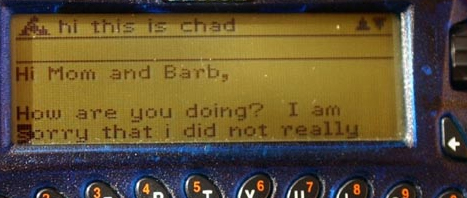Some linguistics would say OMG WTF (Oh My God What The Fuck) to words and acronyms that came out of the technological age. I asked an English professor how languages evolve. She told me the words are often added to a language in two distinct ways; through academics such as Shakespeare and through general usage. In the last ten years most words added to English dictionary did not come from academics, but rather from general usage.
Evolution of Modern English
Unlike in the old days we are heavily depend on electronic devices to communicate with each other. When the telephone was invented, some thought that it will be the end of “letter age”. In 1950s a unit called Pager was introduced to medical staff for faster communication with the hospitals. This trend catch on world wide and almost all hospitals around the world used (and still use) Pagers. The time it takes to transmit data from one client Pager to destination Pager depended on the length of the message being sent. This is because each packet of data (like a photon of light) can only be so big. Longer texts will be “cut in to pieces” transmission. In addition the Pager displays only used one line. Shorter the message easier for the end user to read. Why would you page, “There is a medical emergency. Come in as soon as possible” when you can page “ME ASAP”? I think this is the birth of electronic age acronyms.

But in 1970s Universities and US Government successfully establish a communication system called TCP/IP network (today we call it the Internet). With this the text age has rocketed in it’s popularity. Now the Pager and the Internet has effectively replaced most conventional letters of the “letter age”. This wide use has created the stage for not only modern languages.
Spread of English
English became a popular means of communication thanks to the British imperialism. After World War II, it was boosted by the American and “new world” imperialism. My dad said, “if German and Japanese won the war, today we won’t be speaking English. But rather German and Japanese”. He is right because English is now almost universal.
The popularity of English can be good and bad depend on how you look at it. It is good because compared to hundreds of dead languages, British did a good job in securing the future of their mother language. On the other hand academic institutions that safeguard the rules of English like the Oxford University has completely lost control over their language. In fact a lot of foreign English speakers (English as a Second Language) have contributed to a lot of new words. In July 2013, English-German dictionary now includes “shitstorm” often used by German Chancellor Angela Merkel(1). It is not just her but also a lot of Germans use “shitstorm” to describe out of control situations. While most of the newly added words are profanities, there are a lot of useful good words as well. For example, the phrase “friend zone” describes as “a situation in which a platonic relationship exists between two people, one of whom has an undeclared romantic or sexual interest in the other”(2). It was officially added to Oxford Dictionary in February 2013.
Even in the past
Did you know that Shakespeare invented a lot of words to describe emotions in his plays? British authors were (are) the inventors of new words. Later by the South Africans, Australians, Americans and Canadians also added millions of new words to English language. I find it hypocritical about some modern conservative academics argue against addition of new words. From what I understand, there are more English words originate outside of native English speaking countries than any other language on Earth. Which makes English stronger and better not weaker!
In case you still cannot read the title of this article; Idc wh@t wrds r +ed 2 dic = I don’t care what words are added to (the) dictionary.
References
1. Guardian